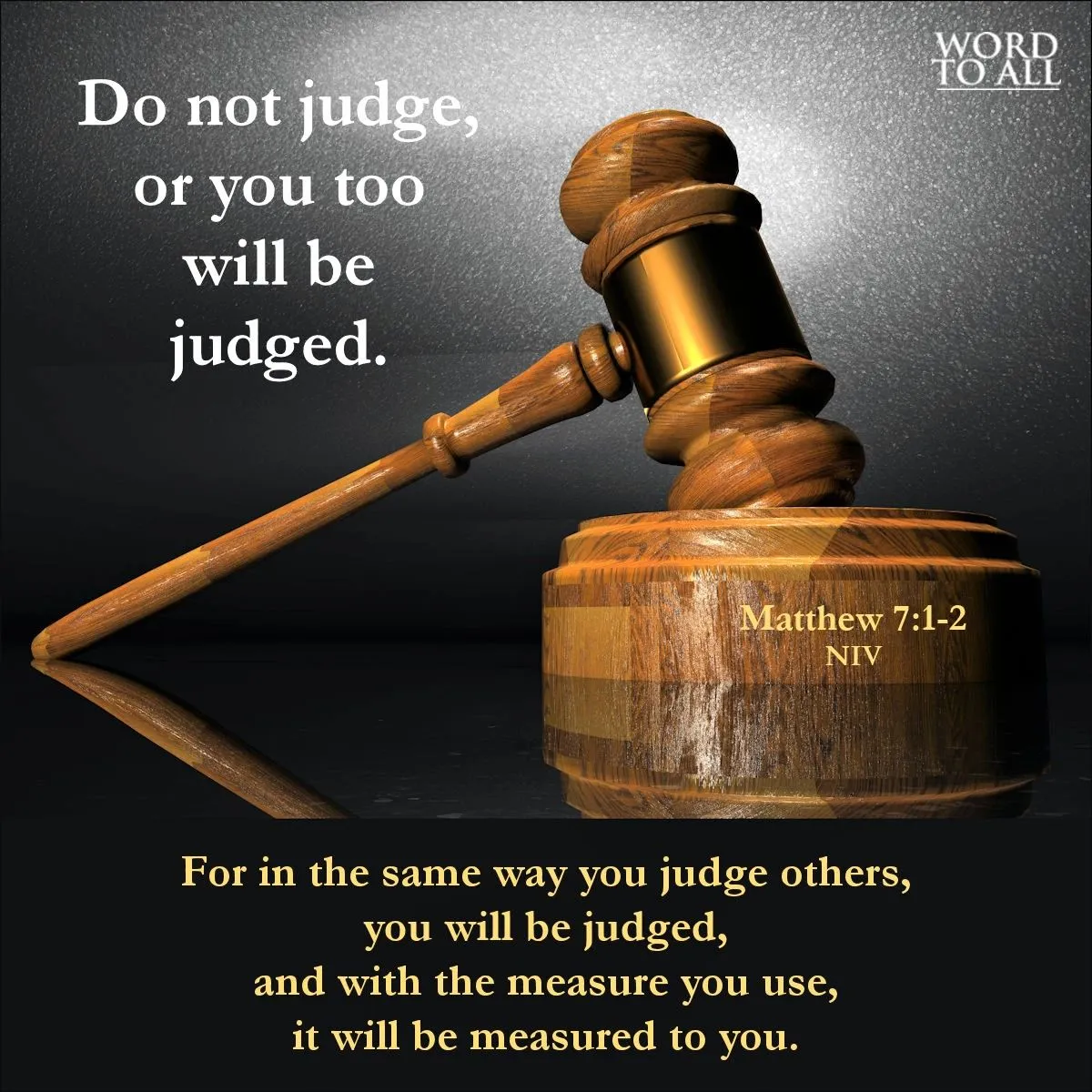Discover the Power of Compassion: Bible Verses for Judging Others Explained
Welcome to this article on Bible verses for judging others. For those unfamiliar with Christian teachings, judging others can seem like a foreign concept. However, it’s important to note that Christianity emphasizes the value of self-reflection and avoiding judgment of others. In this article, we’ll explore the importance of these teachings and how they relate to everyday life.
We’ll discuss specific Bible verses that discourage judging others and highlight the role of compassion and forgiveness instead. By the end of this article, you’ll have a deeper understanding of Christian teachings on judgment and the importance of applying these principles to your own life.

So whether you’re new to Christianity or seeking to deepen your understanding, keep reading to explore the wisdom of the Bible on this topic.
An Introduction to Judging Others in a Christian Context.
As Christians, we are called to love one another and treat others with kindness and compassion. However, it can be difficult to navigate the complex issue of judging others in a Christian context.

Firstly, it is important to understand that judging someone does not necessarily mean condemning them or looking down on them. In fact, we are called to use discernment and make wise decisions about the people we choose to surround ourselves with.
However, when it comes to passing judgment on others’ actions or beliefs, we must be careful not to judge unfairly or harshly. Instead of assuming the worst about someone’s intentions or character based on their behavior alone, take time for empathy and understanding before making any conclusions.
In Matthew 7:1-5 Jesus reminds us “Do not judge so that you will not be judged.” He goes on further saying how hypocritical it is for us as humans who also fall short at times ourselves try passing judgement onto other people’s lives (Matthew 7:3).
It is also important for Christians who want biblical guidance regarding this topic should turn towards verses like James 4:12 which states “There is only one lawgiver and judge—the One who can save and destroy…But you—who are you?”
In summary – while there may be certain instances where discernment requires us as Christians need make judgments regarding our surroundings but ultimately God calls each individual believer into introspection rather than condemnation of those around them
Understanding the importance of self-reflection in relation to judging oneself.
As Christians, it’s important for us to understand the value of self-reflection when it comes to judging others. It can be easy to fall into the trap of criticism and judgement towards those around us, but what does this say about our own character?
In Matthew 7:1-5, Jesus speaks directly on this matter: “Do not judge so that you will not be judged. For in the way you judge, you will be judged; and by your standard of measure, it will be measured to you.” This verse serves as a reminder that we are all flawed human beings in need of grace and forgiveness.
Self-reflection allows us to examine our own biases and tendencies towards judgement before directing them onto others. Rather than focusing on someone else’s shortcomings or mistakes, we should strive for empathy and understanding.
By taking a step back from our initial reactions towards others’ actions or words, we can begin to see things from a different perspective. Maybe there is more going on beneath the surface than what meets the eye.
In James 4:11-12 it states “Do not speak against one another brethren He who speaks against his brother judges his brother…There is only one Lawgiver [Judges] The One Who Is Able To Save And To Destroy But Who Are You Judging Your Neighbor?”

It’s important for Christians especially youth pastors at Christian churches,to remember these verses when speaking with their congregation about judging others.Through self-reflection ,we can become better equipped at showing love insteadof condemnation,and set an example worth following within our community.As God shows mercy upon each other,it helps create an atmosphere where everyone feels welcomed regardless their flaws or mistakes made along life journey.We must always remind ourselves,”Judge Not Lest Ye Be Judged”.
Bible verses that address and discourage judging of others.
As Christians, we are called to love and accept others regardless of their flaws or mistakes. It is important that we do not judge others for their actions, as it is not our place to do so.
One powerful Bible verse that addresses this issue is Matthew 7:1-2 which states, “Do not judge, or you too will be judged. For in the same way you judge others, you will be judged.” This verse reminds us that judging others can lead to negative consequences for ourselves as well.
Another key passage on the topic of judgment comes from James 4:12 which reads “There is only one Lawgiver and Judge, the one who is able to save and destroy. But you—who are you to judge your neighbor?” This passage stresses the importance of leaving judgment up to God rather than taking matters into our own hands.
As Christians it’s important we follow Christ’s example when it comes how we treat those around us. In John 8:7 Jesus said “Let any one of you who is without sin be the first to throw a stone.” The message here being clear – none among us are perfect enough stand in judgement over another person.
By following these verses and focusing on loving our neighbors rather than judging them based on surface-level observations or gossiping about what they may have done wrong; We can become better individuals with more harmonious social lives while also honoring God’s commandments by fostering a compassionate community built upon biblical principles!
The role of compassion and forgiveness in Christian teachings is significant.
Compassion and forgiveness are two essential values that lie at the very heart of Christian teachings. These values emphasize the importance of treating others with kindness, empathy, and understanding.
Jesus Christ himself was a shining example of these virtues. He showed compassion towards all people, regardless of their social status or background. In fact, he went out of his way to help those who were marginalized and overlooked by society.
Forgiveness is another key aspect emphasized in Christian teachings. The Bible teaches us that we should forgive others just as God has forgiven us for our sins. This means letting go of grudges and resentments towards those who have wronged us.
But forgiveness doesn’t mean ignoring or condoning harmful behavior – it means acknowledging the harm caused while still extending grace to the person responsible.

As Christians, we are called to be vessels for these values in our everyday lives – showing compassion towards those around us and forgiving even when it’s difficult.
In Matthew 7:1-5 Jesus says “Do not judge so that you will not be judged” emphasizing this idea further; rather than judging others harshly let’s try to extend love instead – showing compassion leads to healing relationships which is what Christianity is all about!
Conclusion: Applying these Bible verses to everyday life and interactions with others can help us to live more meaningful lives.
As a youth pastor, it is important for me to help my congregation understand the importance of applying Bible verses to everyday life and interactions with others. One area that often needs attention is our tendency to judge others.
In Matthew 7:1-5, Jesus teaches us not to judge others harshly because we will be judged in the same way. This verse reminds us that we are all flawed and need mercy from God and each other.
When we apply this lesson in our daily lives, it means giving people the benefit of the doubt instead of assuming the worst about them. It means being slow to anger and quick to forgive when someone wrongs us or makes a mistake.

Another helpful verse for interacting with others comes from Ephesians 4:32 which says “Be kind and compassionate towards one another, forgiving each other just as Christ forgave you.” This verse emphasizes compassion over judgmentalism by encouraging forgiveness even when it’s difficult.
Applying these verses can be challenging at times but doing so can lead to more peaceful relationships with those around us. By treating people with kindness, compassion, forgiveness – values taught throughout Christianity -we create an atmosphere where conflicts are resolved peacefully rather than through anger or violence.
In conclusion as Christians who want their lives reflecting their beliefs must strive every day towards emulating Jesus’ example by showing love for everyone regardless of social status or background while being mindful not only on what they say but also on how they behave toward others especially strangers who may cross paths during busy schedules so let’s keep striving!
Conclusion
In Christian teachings, it’s important to practice compassion and forgiveness when interacting with others. We must strive to understand that judging another is not something our faith encourages. Instead, we should use Bible verses such as Matthew 7:1-5 and Hebrews 4:12-13 as reminders of why it’s important to focus on ourselves rather than being critical of those around us. By taking these scriptures into account every day, you can apply their wisdom in your life and become a more empathetic individual. Join us at our Christian church for additional discussions about how to incorporate the gospel into everyday living!
















